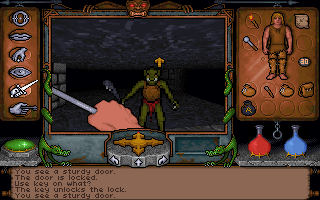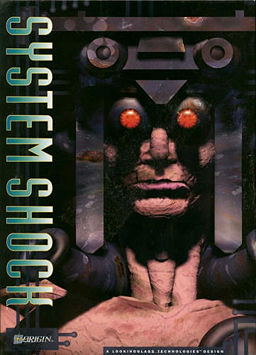History
Having finished work on the 1990 sci-fi role-playing game Space Rogue for Origin, Paul Neurath decided to found his own company with the intent on taking computer role playing games in a new direction. With Origin artist Doug Wike they put together Blue Sky Productions, the precursor to Looking Glass Studios.
The new direction would be realized in the company's only game as Blue Sky, Ultima Underworld: the Stygian Abyss. Neurath took inspiration from the 1987 first-person dungeon crawler Dungeon Master for this project, but instead settling for a game of dungeon crawling and monster slashing, he looked to create an impressive and immersive virtual world inside the dungeon. Not all the creatures in the game would attack you, instead some were non-player characters you could interact with. They inhabited the dungeon in little settlements, where they had bonfires, sleeping quarters, and bathrooms.
 Ultima Underworld: the Stygian Abyss
Ultima Underworld: the Stygian AbyssAt a time when first-person dungeon crawlers were a series of random, nondescript rooms connected by corridors, Ultima Underworld would become one of the most influential computer RPGs of all time. Its technology, depth, and atmosphere left it's contemporaries far behind. The game received wide critical acclaim, sold 500,000 copies, and spawned a sequel: Ultima Underworld II: Labyrinth of the Worlds.
Before release of its follow-up, however, Blue Sky would merge with Lerner Research to form Looking Glass Technologies, later to be renamed Looking Glass Studios. The first game under this new name would be System Shock, a game that took what the company had achieved with the Underworld series to new heights.
System Shock changes the setting from damp dungeons to a cyberpunk future, where you are trapped on Citadel Station with a crazed AI -- SHODAN -- hailed as one of the most memorable video game villains of all time. SHODAN has turned the corridors of Citadel into a war zone riddled with corpses, mutants and cyborgs on patrol. The game's dense atmosphere was achieved by leaving the player completely to his own devices. You do not encounter any NPCs in the world of System Shock. Instead the story is told through a series of e-mails that the player finds around the station.
 System Shock
System ShockThe game featured a physics system that affected all the items in the world as well as the character. For example, when the player ran into a wall or was hit by a bullet, his head would be knocked to the opposite direction of the hit. The interface was also given a face-lift. You were not restricted to the small game windows found in the Underworld series anymore, you could now view the game in full-screen, as well as customize the heads-up display to show items, e-mails, etc.
System Shock was a critical darling, but didn't fare well commercially, selling 170,000 copies. The sequel, System Shock 2, was co-developed by Irrational Games (formerly 2K Boston) and Looking Glass.
After System Shock, Looking Glass went on to develop a flight simulator focused on aerobatics -- Flight Unlimited -- but fans were looking for something less serene. A year later they got Terra Nova: Strike Force Centauri.
Terra Nova leaves the claustrophobic corridors of Underworld and System Shock behind and puts the player in large outdoor areas on four different planets. The environments differ from planet to planet, going from a dead wasteland to an earth-like environment, each of which has unique environmental effects such as moving clouds, a day/night cycle and rain or snow. You control a PBA (Power Battle Armor, basically a small mecha) from a first-person perspective and are given a multitude of weapons (including particle beams, rockets and railguns) as well as three AI controlled teammates for each mission, to whom you can give orders to follow.
Terra Nova turned out to be another game for the critics. It was planned as a series, but it's poor sales put a stop to those plans. It sold around 100,000 units and it's one of the only Looking Glass games that didn't break even.
 Thief: The Dark Project
Thief: The Dark ProjectOne golf game and a sequel to Flight Unlimited later, the folks at Looking Glass would push the envelope again with Thief: The Dark Project. Dubbed a “first-person sneaker” by the development team, the game put players in the shoes of Garret, a professional thief. The game takes place in the steampunk world of “the City,” a metropolis that takes it's influences from fantasy, the Middle Ages and the Industrial Revolution. Unlike it's first-person shooter contemporaries Thief was all about avoiding confrontation and sneaking in the shadows. Avoiding light was essential to your survival, as was not letting the guards hear you. You had to watch the surface you were walking on; carpets would not make any noise, but metal would alarm every guard in the proximity to your location.
Looking Glass experienced some financial turmoil during the development of the game. The Austin branch of the studio was completely closed and half of the staff at Looking Glass was laid off. The rest of the team was under immense stress and some of them voluntarily quit the project, including the lead programmer. Despite all of this Thief was released in 1998 to raving reviews and it sold 500,000 copies. Looking Glass managed to make a sequel to the game, that sold equally well, but it was too late to save the company. Thief II: The Metal Age would be Looking Glass Studio's final game.
The End
In May 2000, mere months after the release of Thief II, Looking Glass closed it's doors. It couldn't afford to pay it's employees any more. They were sure that Eidos would pick up the financing of their next project, but the deal fell through when the bank refused to finance the expenditure.
Part of the reason for their decline has been attributed to the company being in the wrong market. It was releasing hardcore PC games at a time when the consoles were gaining momentum, and it was doing ports of Nintendo 64 games (such as Destruction Derby 64 and the N64 port of Command & Conquer) at a time when the PlayStation was dominating the market. However, according to ex-Looking Glass employees there was no one reason for the company closing it's doors.
"Looking Glass Studios grew extended on debt, which put it in a vulnerable position. Then we got caught by several surprises in a row, which when combined with an inability to secure a funding partner, sealed our fate." -Paul Neurath, via Salon.com
Legacy
Even though the company is long gone, it's influence can still be felt through the industry. Ultima Underworld and System Shock have been cited as an influences to such games as: The Half-Life series, The Elder Scrolls series, Tomb Raider, Vampire: The Masquerade - Bloodlines, and Deus Ex, which had a lot of ex-Looking Glass folk working on it. Ultima Underworld in particular can be seen as a common ancestor to modern 3D RPGs. Paul Neurath went on to make Arx Fatalis, a spiritual successor to the Underworld games, and 2K games, along with notable former Looking Glass employee Ken Levine, developed the commercially and critically successful BioShock in the spirit of the System Shock series.
Thief's sneaking-over-shooting influenced such stealth titles as Assassin's Creed, the Hitman series and the Splinter Cell series.
Rock Paper Shotgun ran a series of interviews on the legacy of the Looking Glass style of design and the GAMBIT Game Lab also interviewed several ex-Looking Glass devs on the history of the studio.
Log in to comment